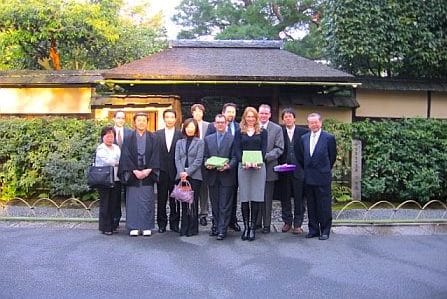Five senior Congressional staff participated in the 19th US Congressional Staff Exchange Program, which was held from February 17–25, 2007, in Tokyo, Aichi, and Kyoto, Japan. During their visit, they met with the leadership of Japan’s major political parties, business and governmental leaders, and other experts to discuss US-Japan cooperation, the evolving framework of East Asian relations, and other pressing foreign policy issues. They were also briefed on Japan’s policymaking process, its political and economic prospects, and new social developments by a wide range of policymakers, analysts, and journalists.
The delegation met with over a dozen Diet members to hear their assessment of how Japan’s policymaking process is evolving and their views on the prospects for future US-Japan partnership. Representative Yukio Hatoyama, secretary general of the opposition Democratic Party of Japan (DPJ), gave an overview of his party’s electoral strategy in the lead-up to the July 2007 Upper House elections, and three key Liberal Democratic Party leaders in the Diet—Ichiro Aisawa, chairman of the House Committee on Rules and Administration; former education minister Kenji Kosaka; and former science and technology minister Toshimitsu Motegi—shared their thoughts on the Japanese style of campaigning and new developments in the policymaking process. The delegation members also took part in a luncheon roundtable with senior Diet policy staff, their immediate counterparts, to compare notes on the role of parliamentary staff and emerging foreign policy issues.
Economic issues and the impact of globalization were also a key topic of discussion in a number of meetings. Shigemitsu Sugisaki, vice chairman of Goldman Sachs and former deputy managing director of the International Monetary Fund (IMF), explained the contributions made by structural reform to Japan’s long overdue economic recovery and how Japan’s economy has become more integrated with its Asian neighbors, while business leaders at Nippon Keidanren (Japan Business Federation) and elsewhere outlined the merits of a new proposal for a US-Japan free trade agreement and the implications of Japan’s postal privatization.
Meanwhile, current and former diplomats, leading journalists, and civil society leaders discussed Japan’s foreign policy, the role of civil society in international relations, and how Japan is gradually redefining its role in East Asia. The delegation members also served as panelists for a public symposium on the changing US political landscape that was attended by more than 60 Diet members and staff, government officials, business leaders, and think tank experts.
After a round of seminars and meetings in Tokyo, the delegation traveled to Aichi Prefecture for a program focusing on local level governance in Japan. Immediately after attending the opening session of the new prefectural assembly, the group spoke about the role of local governments and the local impact of globalization and growing competition from China with the assembly’s chair, Yasuhiro Uchida, and other assembly leaders and officials. The delegation members also received a briefing on Toyota’s international strategy and its application of new energy technologies before making a site visit to an automobile plant.
The next destination for the group was Kyoto, where Representative Seiji Maehara, former president of the Democratic Party of Japan, and his wife hosted a daylong program of meetings for the delegation. Representative Maehara briefed the group on electoral politics and campaign strategies at the district level and then accompanied them to a local campaign launch and a private lecture and demonstration by Soshitsu Sen XVI, head of the Urasenke School of Tea. The delegation members also had a rare meeting with the Seihan Mori, chief abbot of one of Kyoto’s main temples, Kiyomizu Temple, who described the role of Buddhist thought in contemporary society.
This year’s delegation was selected by an advisory board consisting of former members of Congress who reviewed the delegates’ applications. This was reflected in the remarkably high quality of the participants, and for this we owe special thanks to Speaker Thomas S. Foley, Congressman Bill Frenzel, and Congressman David Skaggs.
Participants
CHARLES COGAR, Legislative Director, Sen. Wayne Allard
SIOBHAN O’NEIL, Analyst in Domestic Security and Intelligence, Congressional Research Service
JAMES PARETTI Jr., Workforce Policy Counsel, House Committee on Education and the Workforce
BRANDON RENZ, Legislative Director, Rep. Virginia Foxx
GREGG RICHARD, Minority Staff Director, Senate Subcommittee on International Trade and Finance

